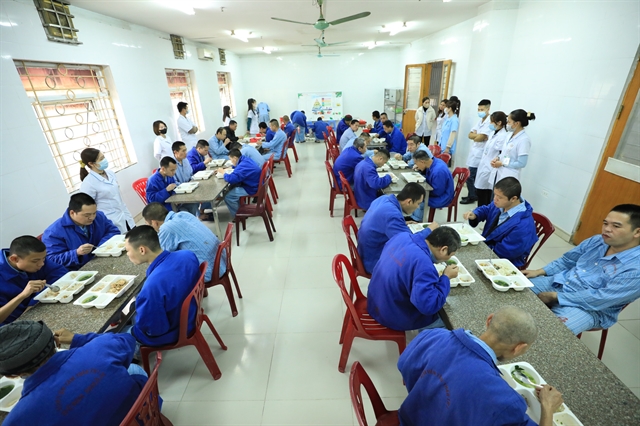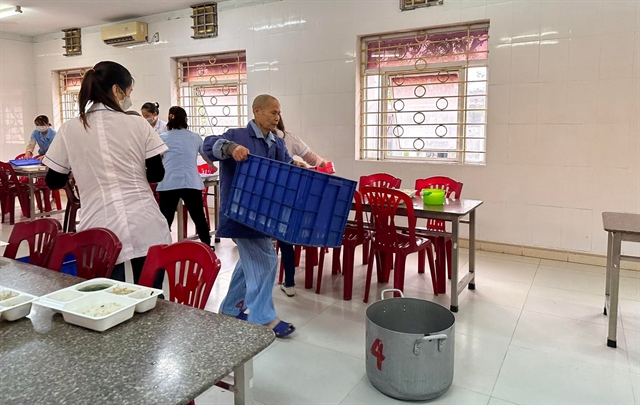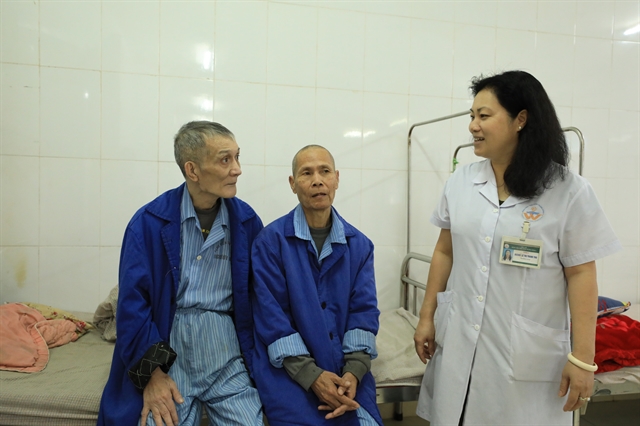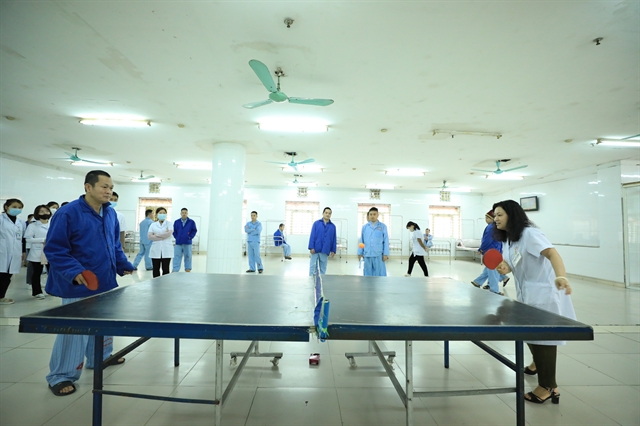 Society
Society

 |
| Lunchtime at Central Psychiatric Hospital No1's Male Sub-acute Department. VNA/VNS Photos |
HÀ NỘI — Võ Quan Nh., a 65-year-old patient at Central Psychiatric Hospital No1's Male Sub-acute Department, briskly walks into the dining room in his blue-striped patient's uniform, pushing a cart filled with lunch boxes.
He neatly arranged the boxes on each table with a satisfied and excited smile. Despite his small stature and old age, Nh. is still active.
He is totally different from his past struggles with mental instability that led to angry outbursts and the destruction of furniture.
Dr Lê Thị Thanh Thu, Head of the Central Psychiatric Hospital 1’s Male Sub-acute Department, says Nh. has been hospitalised since the 1970s due to schizophrenia.
This is his 50th treatment at the facility. The hospital has become a second home to him.
The patient requested to be in charge of tasks in the dining room. According to Thu, Nh. would scold the medical staff if they didn't allow him to do so, so they guide him and supervise him instead.
 |
| Võ Quan Nh., a 65-year-old patient, requests to be in charge of tasks in the dining room. |
The staff's tireless efforts have helped patients like Nh. regain their awareness. Thu noted that the more patients ask for jobs, the happier the staff becomes since it shows that the patients are step by step recovering from their illness.
Currently, 36 patients are being treated in the Male Sub-acute Department. The number of patients is expected to rise to about 50-60 during summer.
Unexpected slaps
Caring for mentally ill patients can be challenging since their reactions can be unpredictable.
The department's windows have crossed iron bars to keep patients safe.
Sometimes, patients can lash out at doctors and nurses.
“We can be attacked for no reason, so we must always be on guard. A patient seems to act normally but then lashes out unexpectedly and attacks us,” Thu says.
 |
| Dr Lê Thị Thanh Thu, Head of the Central Psychiatric Hospital 1’s Male Sub-acute Department, talks with patients. |
Thu recalls one patient threatened the doctors, broke furniture in the middle of the night, and slapped staff members for no reason.
Staff members quickly apprehended him with the help of other male patients later.
"Fortunately, many hospital staff live in the dormitory next to the hospital, so they easily respond to emergencies,” she says.
The Male Sub-acute Department currently has 32 medical staff, of whom only eight are male.
Most psychiatric patients have no family, and many are in long-term treatment. Therefore, doctors and nurses must have extreme patience when treating patients with mental illness.
Some patients may take months and even years to recover, while others stay in the hospital for their whole life. After only one night without enough sleep, patients can be aggressive and violent. Nonetheless, the staff remain committed to helping their patients in any way they can, no matter how long it takes.
Thu says doctors and nurses not only provide medical care but also assist patients with their personal activities, such as changing clothes, cutting their hair, shaving, and cutting their nails and toenails. They also spend hours listening and talking to patients.
 |
| Dr Thu plays ping-pong with patients. |
Six years ago, the health staff purchased a ping-pong table and played with the patients. Thu says that many hospital staff members know how to play ping pong, and she is a skilled player.
More support
Thu expresses regret when many families refuse to follow the doctor's treatment advice after a short time the new mental patients come for treatment.
She says Việt Nam faces a shortage of personnel to monitor and supervise patients closely.
Doctors and nurses wish to have a sanatorium for the mentally ill and their family members to care for their loved ones. For severe cases, patients should be admitted to special treatment areas under the supervision of medical staff for a more extended period.
Currently, each psychiatric patient is only treated for about two months before being discharged.
Thu adds that doctors and nurses want treatment benefits such as seniority allowance, retirement, and preferential treatment for years of dedication and work.
Nguyễn Mạnh Phát, deputy director of the Central Psychiatric Hospital No 1, says that the mental health care network in the country includes 33 psychiatric hospitals, dozens of psychiatric departments in general hospitals, and social disease prevention centres.
However, many provinces and cities do not have a hospital specialising in psychiatry, and even large hospitals do not have psychiatric departments. There is also a serious shortage of doctors in this field.
Therefore, Phát recommends changing the mechanisms and policies on training and recruiting doctors into hospitals or mental health departments to attract human resources gradually. — VNS




